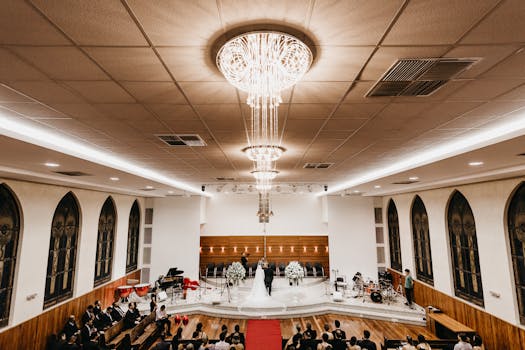Emergency Preparedness: A Must for Your Special Day
Every couple dreams of a flawless wedding, but the reality is that unexpected situations can arise. Having a solid emergency preparedness plan can make all the difference. Start with a detailed checklist several weeks before the event. Ensure that you have a first-aid kit on hand, stocked with basics like band-aids, antiseptic, and pain relievers. This small preparation can handle minor injuries or ailments that may occur, allowing you to focus on celebrating your love. Consider creating a vendor contact list, covering not only your key suppliers but also local emergency services. It’s a good idea to have those numbers readily available for quick access. Weather can also be a wildcard. If you’re planning an outdoor wedding, have a backup plan, including tents if rain is a possibility or cooling stations if it’s unseasonably hot. Don’t forget to communicate this plan to your guests. Have a readily available kit for sudden wardrobe malfunctions. Items like safety pins, tape, and extra makeup can resolve problems quickly. During the rehearsal, discuss these emergency plans with your bridal party and vendors, so everyone knows their role. Remember, being proactive is key. The more prepared you are, the less stress you’ll experience on your big day. Celebrate your love with confidence, knowing that you’ve anticipated challenges and taken steps to address them.
Top Safety Tips for Wedding Guests
Stay mindful of your surroundings. Weddings can be crowded events, and paying attention to your environment helps ensure your safety and that of others.
Keep your belongings close. Always secure your personal items like bags and phones, especially in a bustling venue. A small crossbody bag can be a good option.
Be cautious with alcohol consumption; it’s easy to lose track during celebrations. Remember, drinking in moderation not only preserves your enjoyment but also your safety.
Consider transportation options ahead of time. Whether you’re driving or relying on rideshare services, planning how you’ll get home safely reduces the risk of accidents. Coordinate with friends for group rides whenever possible.
Wear appropriate shoes. While you want to look great, footwear should not compromise your ability to move comfortably without the risk of falls or injury.
Check for any emergency procedures at the venue. Familiarize yourself with exits and safety measures just in case something unexpected occurs; preparedness is key.
Respect the couple’s wishes regarding safety rules. Some weddings might have specific guidelines, especially regarding decor or activities. Adhering to these will ensure everyone’s well-being and enjoyment.
Lastly, stay hydrated! Amidst the festivities, it’s easy to forget to drink water. Staying hydrated keeps you alert and helps prevent fatigue.
Post-Wedding Reflections on Safety Practices
Reflecting on safety during my wedding planning was essential, and I believe it should be a priority for every couple. **Prioritizing the safety of guests and vendors alike was a non-negotiable aspect of our preparations.** We took several proactive measures to ensure that everything went smoothly. First, we made sure to follow local health guidelines, which included providing hand sanitizing stations throughout the venue. **Offering masks was another critical step that showed our commitment to everyone’s well-being.**
Another vital safety practice involved communication. **We created a detailed FAQ section on our wedding website addressing safety protocols, which helped set expectations for everyone attending.** Guests appreciated knowing what to expect and how we were handling safety. Additionally, we considered our venue’s capacity limits, ensuring guests had enough space to feel comfortable without crowding.
Furthermore, we hired professionals for security and crowd control. **This decision made a significant difference, as it allowed us to focus on enjoying our special day without worrying about potential safety issues.** The extra set of eyes also created a sense of security, allowing guests to relax and celebrate freely.
Lastly, I want to emphasize the importance of contingency planning. **Having a backup plan, especially for outdoor events influenced by weather, can save stress and keep safety at the forefront.** Our wedding day was a reflection of love, joy, and, importantly, safety—a balance that enhanced our experience.
Essential Safety Considerations for Luxury Weddings
Safety should never take a backseat, even at the most opulent affairs. One of the first steps involves ensuring that your venue complies with all safety protocols. Verify that exits are clearly marked and accessible, and confirm the capacity limits to avoid overcrowding. Insurance is a must. This includes liability coverage to protect against accidents that may occur during your celebration.
Additionally, consider the health and safety of your guests. If you’re hosting in an enclosed space, it’s wise to have an emergency plan in place. This may include first aid kits or a designated medical professional on site. Don’t overlook communication—having a reliable way to alert guests in case of an emergency is vital.
Transportation safety is another significant factor. If you’re providing shuttles or valet services, ensure that all drivers are accredited and vehicles are well-maintained. Hiring professional drivers instead of relying on friends can enhance safety.
Lastly, think about alcohol service. Responsible serving practices can prevent intoxicated guests from driving home. Consider arranging for safe transport options or providing accommodations for those who may need them. By addressing these safety considerations, you’ll not only create a luxurious atmosphere but also ensure that your day remains joyous for everyone involved.
Ensuring Accessibility for All Guests
Key considerations for making your wedding accessible to everyone.
- Choose an accessible venue. Make sure the location has ramps, elevators, and designated parking for guests with mobility challenges.
- Provide clear signage. Ensure all directions are easily readable and positioned at appropriate heights to assist guests in navigating the venue.
- Include accessibility options in invitations. Clearly indicate if services like sign language interpreters or seating for those needing assistance will be available.
- Consider sensory-friendly elements. If your wedding is in a loud or bright setting, think about providing quieter areas or dimmed lighting options for guests with sensitivities.
- Plan for rest areas. Designate spaces where guests can take a break if they need some downtime during the festivities.
- Communicate with guests. Invite feedback on any specific needs or preferences before the wedding to ensure their comfort and participation.
Feb 16, 2022 … online RSVP. password protected so only invited guests with the password can see details. flexibility to add your own pages. flexibility to …
The bartender at our venue usually get tips from guests (went to a few events here). … Going to a wedding? Find a couple's wedding website. Are you a vendor?
Not tipping wedding vendors. | Weddings, Etiquette and Advice …
Jun 30, 2023 … You can collect guest photos & videos and access them in original upload quality. You can create different galleries for all the events that …
You will need all of the typical wedding vendors, but you may also need … Transportation: Making sure your guests have a safe way to get back to the …
A Guide to Hosting a Backyard Wedding – baileyalexphotography.com
So I'll say, you know your guests— and their relative ages— best. Reply … Going to a wedding? Find a couple's wedding website. Are you a vendor? Learn …
Honest thoughts on Venmo for cash funds | Weddings, Registry …
Language is incredibly powerful. It literally binds marriages. It's the thing that holds together heartfelt vows, hilarious toasts, and welcomes guests to …
Vendor Safety Protocols: What You Need to Know
Selecting the right vendors for your wedding is crucial, not only for quality but for safety. It’s essential to understand their safety protocols, especially in today’s world where health considerations are paramount. Begin by requesting detailed safety measures from each vendor you are considering, whether it’s your caterer, florist, or venue. Ask about their cleaning practices, food handling certifications, and staff training on hygiene. A reputable vendor will be transparent about their processes and should have no problem sharing this information. Ensure that vendors comply with local health guidelines. Don’t hesitate to ask about their compliance with regulations regarding food safety, crowd control, and sanitation. Safety certifications, such as ServSafe for food vendors, can indicate a solid commitment to maintaining high standards. Many venues include safety measures in their contracts, so be sure to review those thoroughly. Also, consider asking about contingency plans for emergencies, whether they relate to health crises or other unforeseen events. A vendor who is prepared for unexpected situations showcases professionalism and reliability. Finally, trust your instincts when it comes to feeling confident in a vendor’s protocols. If something doesn’t feel right, it’s perfectly acceptable to seek alternatives. This vigilant approach ensures that your wedding day is not only beautiful but also safe for you and your guests.
Common Safety Risks at Luxury Weddings
Understanding potential safety risks at luxury weddings is crucial for ensuring a flawless event. Here are key areas to consider.
- Slippery surfaces: Outdoor weddings can present hazards with uneven ground or wet surfaces from weather changes. Make sure to have mats or carpets in high-traffic areas to prevent slips and falls.
- Crowd control: Luxury weddings often draw large crowds. Ensuring proper layout and security is vital to manage guest flow and prevent overcrowding, particularly near exits or high-alert areas.
- Food allergies: With a diverse menu, the risk of allergic reactions increases. Clearly label all dishes and consider a guest dietary sheet to inform caterers well in advance.
- Alcohol consumption: Luxury venues may encourage indulgence, leading to overconsumption. Monitor alcohol service and provide options for guests needing alternative transportation.
- Fire hazards: High-end decorations can sometimes involve candles or pyrotechnics. Ensure that fire safety measures are in place and that all staff are trained in emergency protocols.
- Transportation risks: Arrange for safe transportation options for guests, especially if the venue is remote or involves complex navigation, to prevent accidents and ensure everyone arrives safely.
Incorporating Safety into Wedding Planning
Prioritizing safety in wedding planning is crucial. Ensuring the well-being of your guests and yourself can significantly enhance the joy of your celebration. Start by considering the venue; choose a location that adheres to safety regulations and can accommodate your guests comfortably. Look for venues with adequate fire exits, wheelchair accessibility, and compliance with local health codes.
Next, consider the impact of food safety. Work with caterers who prioritize health guidelines. Verify that their staff is trained in safe food handling and that they maintain proper temperature control for perishable items. Communicate with your caterer about dietary restrictions and allergies to prevent any unforeseen issues.
Your wedding day will likely involve some form of transportation, whether it be shuttles for guests or a getaway vehicle. Ensure all transportation providers are licensed and insured, and that vehicles are in good condition for travel. This reduces the risk of accidents and enhances the overall experience.
Health and safety protocols are particularly essential if you’re planning a larger gathering. Keep an eye on local health guidelines and adapt your plans accordingly, whether that means incorporating social distancing measures or providing hand sanitizer stations. It’s crucial to communicate these safety measures to your guests in advance to set expectations.
Choosing the right vendors also plays a part in safety. Opt for vendors who are transparent about their safety standards and who adhere to the relevant regulations. Whether it’s photographers, florists, or DJs, you want to ensure they prioritize safety in their work.
Communicating Safety Guidelines to Guests
Effectively informing wedding guests about safety measures is crucial for a smooth and secure event.
- Pre-event communication is key. Send out safety guidelines with invitations or through follow-up emails, ensuring everyone knows what to expect.
- Clearly define health protocols. Specify any mask requirements or social distancing measures in place to promote guest safety.
- Utilize signage throughout the venue. Eye-catching signs can remind guests of safety protocols and direct them to hand sanitizing stations.
- Designate a safety officer. Appoint someone to oversee safety measures, enabling guests to have a point of contact for questions or concerns.
- Involve vendors in safety discussions. Make sure caterers, photographers, and other vendors are aware of and adhere to safety protocols for a unified approach.
- Be transparent about any changes. If plans shift due to safety concerns, promptly update guests through group messages or social media.
- Consider dietary restrictions. Communicate options for guests with dietary needs, along with any relevant food safety measures.
Recommended Safety Products for Wedding Vendors
To create a secure environment while executing your services, these safety products are indispensable.
- First Aid Kit: No event is complete without a thorough first aid kit specifically stocked for weddings. Include bandages, antiseptics, and any allergy medications.
- Fire Extinguisher: If your work involves any heat sources or cooking, keep a fire extinguisher nearby. It’s a small price for peace of mind.
- Portable Phone Charger: Having a charged phone can be a lifesaver in emergencies. Invest in a good portable charger to ensure constant communication.
- Safety Vests: If working outdoors, bright safety vests can help you stand out and communicate that you are a professional on-site.
- Non-Slip Shoes: Choose footwear designed to prevent slips on various surfaces. This is especially crucial if you’re dancing around with equipment and decor.
- Electrical Safety Tools: Always check for overloaded outlets and consider employing circuit testers or surge protectors to prevent electrical hazards.
- Emergency Contact List: Maintain a printed list of important contacts, including local emergency services, venue management, and key clients.
- Reflective Lighting: If your job extends into the evening, ensure your workspace is well-lit with reflective lights for visibility, enhancing safety for everyone involved.
Understanding Venue Security Measures
Every wedding venue you consider should have a solid security plan in place to ensure the safety and comfort of you and your guests. From guest screening to emergency protocols, you can never be too prepared. It’s crucial to evaluate what specific security measures each venue offers. Ask about their policies on capacity limits, crowd management, and the training qualifications of their staff. You want to know that they have experience in handling unexpected situations, whether it’s a medical emergency or an unruly guest.
Spectrum of security varies greatly between venues. Some may employ professional security teams, while others might rely on venue staff for oversight. I strongly recommend asking about the level of training that staff members receive in emergency situations. In my experience, venues staffed with trained security personnel tend to provide a greater sense of reassurance.
Another key point to address is access control. Consider whether the venue has measures such as guest lists or wristband systems to keep track of who is entering and exiting the event. This significantly mitigates risks related to uninvited guests or potential disruptions. Pay attention to the venue’s layout. Some spaces naturally enable better crowd management than others. Ensuring there are clear and accessible exits is essential for event safety.
Finally, always anticipate the unexpected. Having a backup plan can be the difference between a minor inconvenience and a major crisis. Discuss contingency plans with your venue manager and ensure they have protocols in place for inclement weather or venue-specific emergencies. Prioritize safety while planning the happiest day of your life—your peace of mind is invaluable.
Managing Guest Health and Safety
Ensuring the health and safety of your guests is a non-negotiable aspect of planning a wedding. From the moment your guests arrive, you should prioritize their well-being. Begin by evaluating the venue’s safety measures, including emergency exits, accessibility, and crowd control strategies. It’s crucial that everyone can navigate the space comfortably and safely.
Consider the current health climate, especially in light of recent global events. Implementing measures like hand sanitizing stations throughout the venue expresses that you care about your guests’ safety. Clearly communicate your health protocols through invitations or signage at the event. Transparency goes a long way in setting expectations and reassuring guests.
Food safety is another key area where attention is essential. Contract reputable catering services with solid hygiene practices. Ensure that all food is prepared and served safely to avoid any health issues. Buffet-style dining has become less popular; opting for plated meals or individual servings reduces cross-contamination risks. Always prioritize the quality and safety of what your guests consume.
If your wedding involves outdoor activities, consider potential risks such as weather conditions or uneven terrain. Provide shade, seating, and options for inclement weather to ensure your guests feel comfortable and safe throughout the day. Be proactive about informing guests about your emergency preparedness plans, should any issues arise.
Finally, it’s crucial to accommodate any specific health needs your guests may have. Include questions regarding allergies and dietary restrictions in your RSVP forms, allowing you to cater to individual requirements. Your guests will appreciate your thoughtfulness and attention to their unique needs.
As an Amazon Services LLC Associates Program participant, we earn advertising fees by linking to Amazon, at no extra cost to you.
What are the common safety issues at weddings?
Weddings can be magical, but safety issues can’t be ignored. One major concern is crowd control; too many guests in one area can lead to accidents. Food safety is another critical area. Ensuring that food is stored and served at the right temperatures can prevent foodborne illnesses. As for the venue, be cautious of slippery floors, especially if it rains or if the dance floor gets crowded. Interview your vendors about their safety protocols. Ensure that the caterer, florist, and any entertainment are equipped to handle emergencies. Finally, alcohol consumption can escalate into safety issues; managing how much is served and having designated drivers can mitigate risks. Remember, taking these precautions will help keep the focus on love, not liabilities.
How can guests ensure their own safety at weddings?
Prioritize your personal safety when attending a wedding. Communicate any dietary restrictions to the couple or caterer, ensuring you avoid allergic reactions. If the venue is in a remote area, familiarize yourself with the location and emergency contact numbers. Be mindful of your surroundings. Stay alert for any potential hazards like wet floors or uneven surfaces. If consuming alcohol, have a designated driver or a safe transportation option arranged in advance. Always respect the couple’s wishes regarding health and safety protocols. If masks are required or recommended, comply. Consider bringing hand sanitizer and maintaining distance where possible, especially if you’re in a crowded area. Keeping personal items secure also minimizes risks; ensure wallets, phones, and valuables are not left unattended. Your proactive approach to safety contributes to an enjoyable event for everyone.
Are there insurance policies specifically for wedding events?
Yes, there are insurance policies specifically designed for wedding events. These policies can protect you from financial loss due to various unforeseen circumstances, such as vendor cancellations, venue damages, or extreme weather. When I was planning my wedding, I realized how crucial it was to safeguard my investment, and wedding insurance provided that peace of mind. Typically, coverage options include liability insurance, cancellation coverage, and even coverage for special items like rings and bridal attire. It’s worth considering these policies to protect your big day from potential pitfalls.
What should vendors do to prepare for emergencies?
Vendors must develop a clear emergency plan that addresses potential risks such as weather issues, medical emergencies, or supply chain interruptions. This plan should include contact information for local emergency services and a designated meeting place for staff and clients. Regular training sessions for staff on emergency procedures are essential, so everyone knows their roles in a crisis. Always maintain an adequate supply of essential items, such as first-aid kits, extra equipment, and backup power sources. Communication is key—ensure multiple channels are available, like phones and social media, to inform clients quickly. Always stay informed about the venue’s emergency protocols and share these details with clients beforehand. Preparation is about anticipating challenges and having the resources to manage them with confidence.
How do I communicate safety plans to my guests?
Clearly communicate your safety plans in advance. This can be done through your wedding invitations or your wedding website. Include details about health protocols, emergency exits, and any relevant restrictions. Consider creating a FAQ section on your website. Address common concerns such as mask requirements, social distancing guidelines, or what to do in case of an emergency. Don’t hesitate to send reminders! A week before the wedding, a simple email reiterating the plans can ensure everyone is on the same page. Use clear language and bullet points to make the information digestible. Lastly, assign a point person, perhaps a trusted friend or family member, who can address any concerns on the day of the event. This proactive approach will help everyone feel secure and ready to celebrate your big day.
What first aid measures should be in place during the wedding?
Having first aid measures in place during the wedding is non-negotiable. Basic first aid supplies should be easily accessible, including adhesive bandages, antiseptic wipes, gauze, and a pair of scissors. Consider appointing a designated first aid officer from your wedding party or a professional services team for any emergencies. It’s crucial to have an emergency response plan, including contacts for local medical services. Ensure that everyone knows where the first aid station is located, and if you’re outdoors, keep the area shaded and well ventilated to prevent heat-related issues. If you have guests with known allergies, prepare medication like antihistamines on hand. A simple approach can make a big difference; don’t overlook the potential need for basic medical response on your special day.
Your guests’ safety is crucial; ensure your venue complies with health regulations and has adequate emergency procedures in place. Consider factors like crowd control, seating arrangements, and accessibility to create a secure environment.
**Guests must clearly understand the required safety protocols for our wedding day.** Communicating these expectations ensures everyone’s comfort and safety while enjoying the celebration. Advise on mask usage, social distancing, and hand sanitization stations to make it easy for guests to comply.
Having vendors’ emergency contacts is crucial for a smooth wedding day. I learned this the hard way when a vendor vanished. Always secure direct lines to reach them quickly in case issues arise.
**I strongly recommend securing insurance policies that cover liabilities related to your wedding.** Accidents can happen, and having the right coverage protects against unexpected costs that could ruin your special day.
**Being aware of local health regulations can save you from costly mistakes.** Venue restrictions, guest limits, and catering rules vary widely. **Check often to avoid last-minute surprises that could impact your celebration.**
I firmly believe that hiring qualified security personnel is essential for ensuring the safety of your wedding day. This not only protects your guests but also allows you to focus on your celebration without worry.
As an Amazon Services LLC Associates Program participant, we earn advertising fees by linking to Amazon, at no extra cost to you.

I’m Marta, a passionate wedding specialist with over 25 years of experience in the wedding and party planning business.








